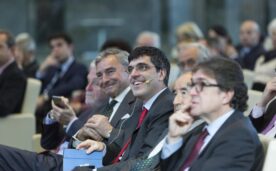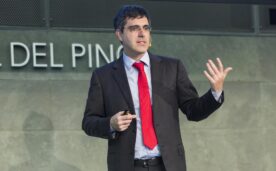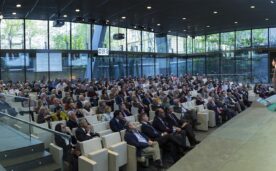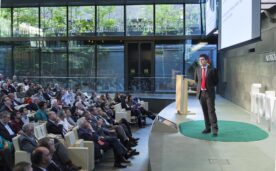Challenges and opportunities for the Spanish economy in uncertainty
Summary:
On 28 April 2016, the Rafael del Pino Foundation organised a conference by Jesús Fernández Villaverde, Professor of Economics at the University of Pennsylvania, on the challenges and opportunities for the Spanish economy in these uncertain times. The Spanish economy is currently affected by five types of political uncertainties: the repetition of the general elections, territorial problems, the transformation of the party system with the emergence of Podemos and Ciudadanos, the political problems of the European Union and the underlying tensions in the global economy. These uncertainties have had significant costs for the Spanish economy. According to Fernández Villaverde's estimates, economic growth has slowed by four to seven tenths of a percentage point, the risk premium has risen to 70 basis points and around 126,000 jobs have not been created. The paralysis of Spanish political life is something that does not happen in our neighbouring countries, with which we should be on a par. And that is the problem because we have lost five legislatures in terms of the structural reforms that the Spanish economy needs to grow based on productivity, technology and the creation of added value. In fact, according to Fernández Villaverde, we have been 37 years without productivity growth. If productivity had increased by 2% per year, Spain's per capita income would be twice what it is today. In his opinion, therefore, we cannot lose a new legislature, because we have to face two major economic challenges: productivity growth and fiscal sustainability. If we do not do so, our problems will become bigger and bigger, but this is something that politicians have not yet internalised. The 2016 budgets are not sustainable and what little progress has been made in reducing the public deficit has been thanks to economic growth that is now slowing. But on the expenditure side there is not much left to cut because Spanish public administrations spend less per person than the countries around us. And the solution to the deficit problems lies neither in the fight against fraud nor in raising taxes on the rich. What Spain needs is a pact on economic growth, public accounts, the labour market and structural reforms. Not forgetting issues related to the ageing of society.
The Rafael del Pino Foundation is not responsible for the comments, opinions or statements made by the people who participate in its activities and which are expressed as a result of their inalienable right to freedom of expression and under their sole responsibility. The contents included in the summary of this conference are the result of the debates held at the meeting held for this purpose at the Foundation and are the responsibility of their authors.
The Rafael del Pino Foundation is not responsible for any comments, opinions or statements made by third parties. In this respect, the FRP is not obliged to monitor the views expressed by such third parties who participate in its activities and which are expressed as a result of their inalienable right to freedom of expression and under their own responsibility. The contents included in the summary of this conference are the result of the discussions that took place during the conference organised for this purpose at the Foundation and are the sole responsibility of its authors.







